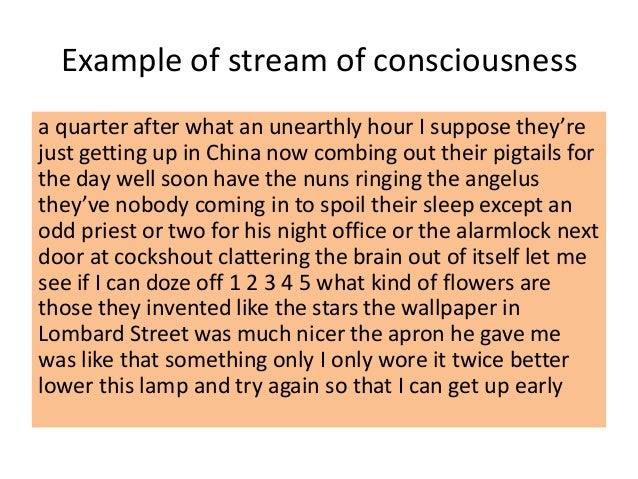Stream of Consciousness
Jump to navigation
Jump to search
A Stream of Consciousness is a mental process that generates a continuous flow of thoughts, sensations, and mental content (representing immediate experience in rhythmic pulses rather than a constant linear flow).
- AKA: Internal Stream, Mental Flow, Consciousness Stream.
- Context:
- It can generate Thought Flow through spontaneous association.
- It can capture Sensory Experience through immediate perception.
- It can integrate Memory Fragments through associative linking.
- It can produce Emotional Content through experiential flow.
- It can maintain Mental Continuity through consciousness process.
- It can process multiple Sensory Inputs beyond just verbal thought.
- ...
- It can often reveal Unconscious Patterns through spontaneous emergence.
- It can often combine Memory, Sensation, and Thought through simultaneous processing.
- It can often reflect Emotional States through content patterns.
- It can often process Environmental Inputs through immediate integration.
- It can often manifest in Rhythmic Patterns rather than continuous flow.
- ...
- It can range from being a Coherent Narrative to being a Fragmented Experience, depending on its mental state.
- It can range from being a Linear Progression to being a Non-Linear Association, depending on its thought pattern.
- It can range from being a Clear Consciousness to being a Dream-Like State, depending on its awareness level.
- It can range from being a Verbal Process to being a Multi-Sensory Experience, depending on its content type.
- ...
- It can range from being a Direct Stream of Consciousness to being a Fragmented Stream of Consciousness, depending on its mental state.
- It can range from being a Linear Stream of Consciousness to being a Associative Stream of Consciousness, depending on its thought pattern.
- It can range from being a Clear Stream of Consciousness to being a Dreaming Stream of Consciousness, depending on its awareness level.
- It can range from being a Verbal Stream of Consciousness to being a Sensory Stream of Consciousness, depending on its experience type.
- Examples:
- Stream of Consciousness Expressions, such as:
- Stream of Consciousness States, such as:
- Meditative Stream of Consciousness States, such as:
- Creative Stream of Consciousness States, such as:
- ...

- ...
- Counter-Examples:
- Structured Thought, which imposes logical order.
- Focused Attention, which maintains singular focus.
- Rational Analysis, which applies conscious filtering.
- Planned Narrative, which follows predetermined structure.
- Reasoned Argument, which requires logical progression.
- State of Mindfulness, which involves intentional awareness.
- See: Consciousness, Internal Monologue, Free Association, Mental Process, Mindfulness, Cognitive Flow, Subconscious Process, Day Dreaming, Awareness, Consciousness, Day Dreaming, Awareness.
References
2015a
- (Wikipedia, 2015) ⇒ http://en.wikipedia.org/wiki/Stream_of_consciousness_(psychology) Retrieved:2015-5-9.
- Stream of consciousness refers to the flow of thoughts in the conscious mind. The full range of thoughts that one can be aware of can form the content of this stream, not just verbal thoughts. Commonly used experimental techniques, including self-reporting, gives easier access to verbal thoughts than to thoughts more closely connected to senses other than hearing and activities other than speaking and writing.
2015b
- http://www.nytimes.com/2015/05/10/opinion/sunday/its-not-a-stream-of-consciousness.html
- QUOTE: IN 1890, the American psychologist William James famously likened our conscious experience to the flow of a stream. “A ‘river’ or a ‘stream’ are the metaphors by which it is most naturally described,” he wrote. “In talking of it hereafter, let’s call it the stream of thought, consciousness, or subjective life.”
While there is no disputing the aptness of this metaphor in capturing our subjective experience of the world, recent research has shown that the “stream” of consciousness is, in fact, an illusion. We actually perceive the world in rhythmic pulses rather than as a continuous flow.
- QUOTE: IN 1890, the American psychologist William James famously likened our conscious experience to the flow of a stream. “A ‘river’ or a ‘stream’ are the metaphors by which it is most naturally described,” he wrote. “In talking of it hereafter, let’s call it the stream of thought, consciousness, or subjective life.”